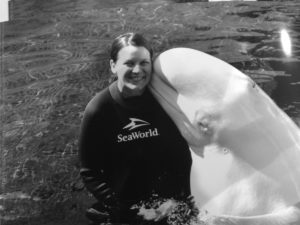Amanda

I was sitting on the floor next to my husband as we bathed our young child together, soaked through with bubbles and water from bath toys, physically and emotionally drained from being with my one-year-old all day.
I turned to my husband and asked, “When you became a dad, did you feel like you lost a part of who you are — a part of your identity?”
He quickly and happily responded, “No! I feel like I gained another identity. Why, do you?”
A familiar, hollow sensation settled over my whole body as the realization sunk in that my postpartum depression had become more than a passing phase I could work my way through or bide my time until it passed. This wasn’t my first losing fight with depression, and I didn’t want to face it again.
The hollowness was followed by a sense of confusion, loneliness, and hurt over how much I had lost to depression throughout my life (and how difficult it was to communicate that to my husband–my closest confidant). How could I tell him he was fortunate not to have experienced the inability to get out of bed like I did in graduate school, or the night terrors that accompanied the depression I experienced in my late twenties, or the self-doubt permanently part of my psyche even after the depression subsided?
I began to resent conversations with friends and family checking in with me. I feared that sharing my depression with them would come across as cliché. And I felt even more guilt that none of this was their fault — it was mine. I felt guilty for feeling depressed because I had worked so hard to have this baby, years in fact, and now the one thing that had brought me joy for nine months left me feeling empty.
Before motherhood, I had been a successful professional, well-educated and self-motivated. Now there were days, full days, where I found myself mothering from under a blanket with the television on in the background or yelling at my daughter over little things. People gave me well-meaning advice to join a mother’s group or to develop hobbies, but that led to even darker days where I could not think of one thing I was good at or would be qualified to do. I lost interest in anything that required the energy to get outside my house and had a difficult time connecting with anyone, including my family.
I realized in that moment with my husband that the personal suffering I had been experiencing for over a year and a half was more than just the “baby blues.” I was depressed, and I had lost track of my most important role in the world: me.
Treatment for depression and anxiety is complicated. Putting the proper plan in place requires an individualized and collaborative approach. However, in the therapy appointments that followed my awakening, my therapist diagnosed me with depression, but never asked me about my current or past medical treatments, never checked my hormone levels, and never provided any treatment tools aside from the medications pressed on me.
My husband also had no place to go to find the support he needed to be there for me or understand what I was feeling. There were tools and words we desperately needed to get through the additional layer of depression I would experience just a few months later from a miscarriage, but we never found them.
I’m still working to build my toolkit to manage my depression. But what I am still missing is a multidimensional treatment plan collaboratively created by experts who look at every physical and mental component to understand what I’m going through and what will ultimately alleviate my suffering.
My moment of light has been creating a new organization called Lives Unencumbered with two amazing women who also struggle daily with depression and anxiety. It’s been healing to hear others stories and to help build a new way to treat depression and anxiety: no mother, father or child should have to navigate this darkness alone. I firmly believe that with a more holistic approach we can win back the most important person to your healing process: you.
